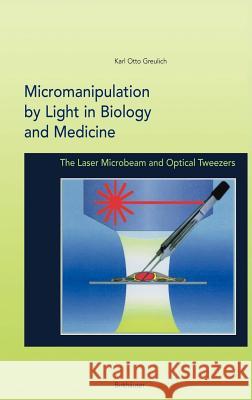Micromanipulation by Light in Biology and Medicine: The Laser Microbeam and Optical Tweezers » książka
Micromanipulation by Light in Biology and Medicine: The Laser Microbeam and Optical Tweezers
ISBN-13: 9780817638733 / Angielski / Twarda / 1999 / 300 str.
Micromanipulation by Light in Biology and Medicine: The Laser Microbeam and Optical Tweezers
ISBN-13: 9780817638733 / Angielski / Twarda / 1999 / 300 str.
(netto: 764,96 VAT: 5%)
Najniższa cena z 30 dni: 771,08
ok. 22 dni roboczych
Dostawa w 2026 r.
Darmowa dostawa!
There are probably few people who do not dream of the good old times, when do- ing science often meant fascination, excitement, even adventure. In our time, do- ing science involves often technology and, perhaps, even business. But there are still niches where curiosity and fascination have their place. The subject of this book, technological as its title may sound, is one of the fortunate examples. It will report on lasers generating the coldest places in the Universe, and on table top laser microtools which can produce a heat "inferno" as it prevails in the interior of the Sun, or simulate, for specific plant cells, microgravity of the space around our plan- et Earth. There will be some real surprises for the reader. The applications range from basic studies of the driving forces of cell division (and thus life) via genetic modification of cells (for example, for plant breeding) to medical applications such as blood cell analysis and finally in vitro fertilization. What are these instruments: laser microbeams and optical tweezers? Both are lasers coupled with a fluorescence microscope. The laser microbeam uses a pulsed ultraviolet laser. Light is focused, as well as possible, in space and time, in order to obtain extremely high light intensities - high enough to generate, for a very short instant, extremely hot spots which can be used to cut, fuse or perforate biological material.











